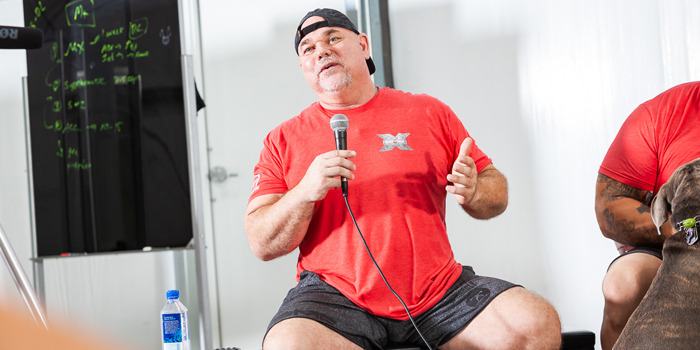
The elitefts Learn To Train X (LTTX) seminar took place in early August, bringing together trainers, coaches, athletes, and competitors across the powerlifting industry for the intensive three-day event. Participants were able to attend lectures from respected strength and performance educators, and also had the opportunity to experience hands-on instruction at training stations dedicated to perfecting squat, bench press, and deadlift techniques. To kick off the lecture series, Dave Tate spoke to the group about his training philosophy.
WATCH: elitefts Core Values — Focus
In this presentation, Tate breaks down the components of the famous “Live, Learn, Pass On” philosophy that has shaped his personal journey, as well as the overarching mission of elitefts. The insights that he reveals not only ring true at an individual level, but also at an industry level, thereby shaping the future of the sport for the next generation.
Learning to “Live”
Tate explains that although elitefts has had several mottos over the course of its 20-year history, the motto that they consistently return to and rely on is “Live, Learn, Pass On”. This originally began as the core of Tate’s personal life philosophy that, over time, became infused into his business as well. He starts off by setting the stage for the first element of the philosophy: “live”.
You can’t change the past, but you can learn from it; you can’t predict the future, but you can prepare for it. What you can do is pay attention to what’s going on right now…You have to be able to learn how to auto-regulate your training.
During any training process, there are a thousand different “micro-decisions” that have to be made. Oftentimes, this means that the choices you make may differ from what you thought you were going to do that day. As Tate discusses, sometimes the right decisions involve deviating from the plan. In examining the training programs of powerlifters that have been competing for over 20 years, it is clear that their workouts, approaches, and exercises must be altered at times based on how their bodies are feeling. They are constantly auto-regulating, tweaking, and pivoting as they listen to what their bodies need at a particular time.
Unfortunately, Tate acknowledges, there are some athletes that still choose to train based off of what’s outlined on a piece of paper that was handed to them. In doing so, they eliminate a key component of what it means to train effectively. As a result, they may not be able to warm up like they need to, handle the heavier loads, or see gains in their performance. Truly “living” involves listening your body and responding accordingly in that moment.
Those little decisions are what I would consider being ‘there’… paying attention to what’s going on, while you’re there in the gym, at that time – not what next week’s training is going to be or last week’s, but what’s happening right now, and being able to pivot from that… That’s the ‘live’ part.
Learning to “Learn”
The second component of this philosophy is very much so connected to the first. Naturally, the ability to productively auto-regulate a training program requires a certain level of education. As Tate explains, learning how to employ proper form and technique, understanding different training methodologies, and knowing who to go to for guidance are critical factors for success. The more you can learn about the sport and about your body, the better you’ll be able to navigate all of the micro-decisions involved with auto-regulating your training program.
MORE: Learn to Train X — 20 Years in the Making
Blindly following the direction of a coach or training partner is ill-advised. Tate states that there are very few people with the genetic ability required to be successful in the sport of powerlifting without proper education. Although he admits that he’s seen this kind of “complete idiot” perform well a time or two, he also says that these kinds of athletes typically don’t last very long – especially in powerlifting.
Learning to “Pass On”
Tate attributes a large part of his success to the support and guidance of others. Having entered into the sport when there was really no such thing as a strength coach, Tate explains that all of the help that he received was simply a form of passing on knowledge. There was no transaction tied to anything; the people that helped him improve did what they did free of charge.
They weren’t strength coaches, because they didn’t have a name – they didn’t have a title. They were the people in the gyms that were walking up to someone doing pull-downs and sticking a knee in their back and saying, ‘Dude, keep your chest upright.
In other words, they were the original planters of the seeds that would grow into, what is today, a flourishing industry. Tate identifies very strongly with this sense of duty to pass on his knowledge and learnings to others. Not doing so, he states, would simply be a disservice to the industry. In fact, it’s an industry that is currently at-risk due to the behavior of some people that avoid “passing on” unless they receive something in return.
To illustrate his point, Tate paints a picture of a farmer in a field, planting seeds, watering the grass, and waiting for plants to grow. After a while, the farmer leans up against a tree in the forest, frustrated with the lack of results. He vows to stop farming unless he receives payment for it, because he believes that his time is worth far more than this. What the farmer doesn’t realize, however, is that the tree that he’s leaning up against was planted years ago by a farmer who sowed his seeds without payment. The angry farmer, of course, represents those professionals in the powerlifting industry today who are not in the mindset to “Pass On”.
Tate argues that this approach is the equivalent of laying concrete in that very field, still somehow expecting to see a fruitful harvest. If we’re not willing to “Pass On”, then we’re jeopardizing the future of the profession and limiting opportunities for the next generation of powerlifters and athletes.
Seeing the Return
This philosophy, like any other, is not without its critics. Tate acknowledges that at times he does receive kick-back for what he believes. Doubters say to him, “Why should I help someone for free? Why should I spend time providing training programming, only to get nothing in return?” The truth is, these are feelings that Tate knows all too well. For instance, he’ll spend hours with coaches and lifters to help them develop their training philosophies, only to have them outfit their entire gym with equipment from another company. At first, this may seem like a slap in the face. After all, it’s only natural to believe that if you throw out a med ball rebounder, so to speak, that it should come back to you. Yet, Tate always makes a point to take a step back and consider the bigger picture:
How many hundreds of thousands of people have done business with us that I’ve never spoken to? Throw the med ball out, and thousands come back. Don’t be looking for the one [that] you threw out to come back – that’s not how it works. That’s what ‘passing on’ is… Everybody thinks you have to have a return for what you put out. Maybe you already have it, but you’re too egotistical or naïve to see it.
As Tate describes, it’s not a one-for-one system – that’s just not how the universe works. As such, perhaps it’s time we all shift our perspectives to more of a “Live, Learn, Pass On” mindset. Otherwise, we may never be able to see the forest for the trees.









